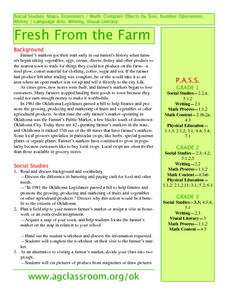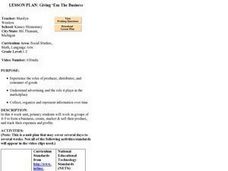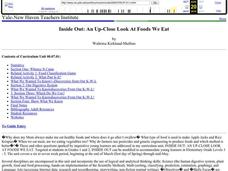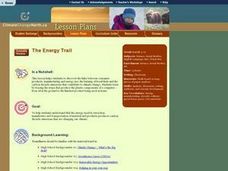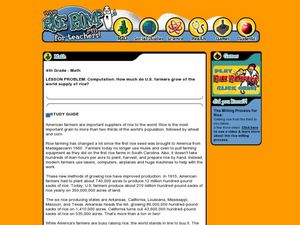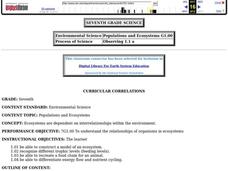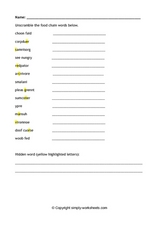Curated OER
Market Day Adventure
Second graders participate in the Market Day project. They produce goods, market goods, and earn money to buy goods.
Curated OER
Everyone Up!
Learners examine various agriculture careers, both direct and indirect, related to crop production and distribution. In this food production lesson plan, students role play the processing chain in which crops move from producer to...
Curated OER
Culture Creation vs. Culture Consumption - Finding Voice Through Digital Storytelling
Ninth graders explore the power of media in culture and Gandhi's philosophy of nonviolence. In this nonviolence and media lesson, 9th graders analyze Gandhi's nonviolent methods for social change and discuss the media's power to create...
Curated OER
Population and resources(
Students describe what a consumer is and give examples of how we affect the earth. They explain how we as consumers can change our actions to have less of an impact. Students discuss "How can we reduce the size of our footprint?"
Curated OER
Fresh From The Farm
Students investigate the concept of a farmer's market and how it used in the community. They conduct a survey to find the kinds of produce grown to be sold in the market. The lesson includes extensive introductory information for...
Curated OER
The Artist as Entrepreneur: Getting Down to Business: What's My Market?
Students create a marketing plan for their artwork by analyzing their potential customers. They consider the type of art they wish to produce, the price range for the art and the type of competition that they face then develop a low...
Curated OER
Giving Them the Business
Pupils work in small groups of 4-5 students to form a business, create, market and sell their product, and track their expenses and profits. They experience the roles of the producer, distributor, and consumer of goods.
Curated OER
Everything's Connected
Students explore how trash decomposes. In this ecosystem lesson, students discuss new vocabulary words, such as producers and consumers, and think critically to answer how landfills work.
Curated OER
Inside Out: An Up-Close Look At Foods We Eat
Fourth graders identify the origins of meats and vegetables consumed by humans on a daily basis. They classify foods (meats, dairy products, grains...) and create a food pyramid.
Curated OER
The Energy Trail
Students examine the relationship between the products they use and energy use. Using the internet, they identify the role that manufacturing plays in using energy and the emissions that change the climate. They discover the steps to...
Curated OER
Free Enterprise -- Product Cost
High schoolers are introduced to the concept of free enterprise. In groups, they discuss the price of various food items and decide on which item to produce. They calculate the cost of producing the item and share their results with...
Curated OER
How much rice to US farmers grow?
Fourth graders examine rice farming. In this rice farming lesson, 4th graders compute how much of the world's rice the US produces. Students gain information about the history of growing rice and how much rice other countries grow as...
Curated OER
Populations and Ecosystems
Seventh graders create a model of an ecosystem and label it to show structure and function. They research the food web of an aquatic animal and also trace energy flow from the primary producer up the food chain.
Curated OER
Activity #19 Oxygen For Yeast
Students observe and record what occurs when yeast is added to hydrogen peroxide. They indicate why a chemical reaction (decompostion) must have occurred during the experiement. Pupils explain why yeast was used. Students comprehend the...
Curated OER
Hey, Mom! What's for Breakfast?
Students examine how he world eats breakfast. In this food choices lesson, students work in groups to list breakfast foods and their ingredients and find goods and consumers on the list. The, students use the Internet to complete a...
Curated OER
Materials, Let's Do the Life Cycle
Students examine environmental and social impacts of products that consumers buy. For this environmental stewardship lesson, students play a game that requires them to consider real costs of products. Students consider the environmental...
Curated OER
Food Webs and Chains
Fifth graders examine how simple food chains and food webs function. They examine an illustrated food chain/food web and identify the producers and consumers. Students then sequence pictures of animals into a food web, and create their...
Curated OER
Over a Barrel
Students examine oil reliance in Britain and around the world. In this oil crisis lesson, students discuss how oil is produced and consider the supply left in the world. Students also examine the influences of oil prices and discover the...
Curated OER
How Does One Cope With Life-Changing Events?
Second graders identify coping skills during times of stress. In this mental health lesson, 2nd graders read the story, Stressed Out Sally and brainstorm events that produce stress. Students rewrite a different version of the story...
Curated OER
Goal Setting: Respect for ALL Workers
Students discuss their views on the importance of various jobs. In this career paths and goal-setting lesson, students create a list of all jobs required to produce a particular object. Students then prioritize the importance of certain...
Curated OER
From Polymers to Bioplastics: Looking Toward Finding Renewable Resources
Students investigate the properties of polymers. In this chemistry lesson, students explain the importance of energy sources. They produce a bioplastic from the lab and evaluate its structural integrity.
Simply Worksheets
Food Chain Word Scramble
In this food chain words worksheet, students unscramble the food chain words and then find a hidden word. Students unscramble 14 words total.
Curated OER
Ecological Succession in Pond Water Cultures
Students collect samples of pond water, dried grass, and soil in a jar. They predict the order of ecological succession in their pond water cultures. They compare their expected results with their observed results.
Curated OER
Insect Travel Brochure
Seventh graders explain what a trophic level is and how different organisms fit into different trophic levels. They observes different insect habitats and find reasons for why some habitats may be better suited for insects, than other...
Other popular searches
- Consumers and Producers
- Science Producers Consumers
- Producers and Consumers Poem
- Marine Producers Consumers
- Producers Consumers Writing
- Consumers Producers
- Consumers, Producers






